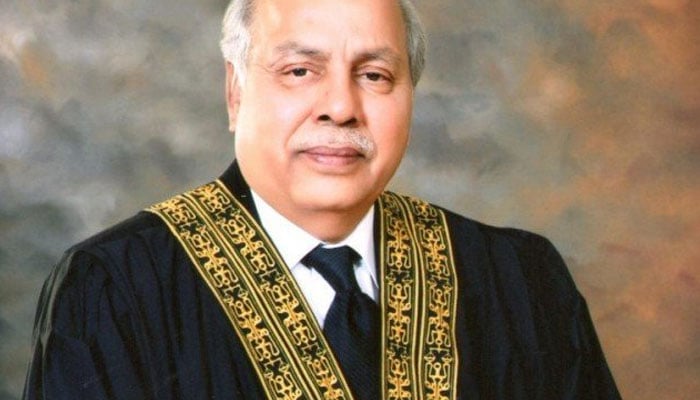Supreme Court has right to solve disputes among Federation, provinces: CJP
ISLAMABAD: The course participants of National Security and War-2021 on Thursday visited the Supreme Court (SC) of Pakistan. The main purpose of their visit to the Supreme Court of Pakistan was to get an orientation on the judicial system of Pakistan.
The visitors comprised faculty members of the National Defence University, officers of Pakistan Army, Pakistan Navy, Pakistan Air Force and Civil Service, including military officers from the friendly countries.
Chief Justice of Pakistan (CJP) Justice Gulzar Ahmed, while addressing the participants, briefed them about the judicial system in Pakistan as well as about the Supreme Court of Pakistan, the high courts of the provinces and the ICT, and other courts created by law.
The CJP said that the Supreme Court was also conferred by the Constitution, the original jurisdiction to adjudicate and determine disputes between two governments that was between the federal and a provincial governments or between two provincial governments. He said that he was given constitutional right to implement decisions.
He said, "As of now, I will deal with the subject of the Supreme Court, the high courts of the provinces and the ICT, and other courts created by law. The Chief Justice also briefed the participants about four-tier judicial system operating in Pakistan, both for ordinary civil and ordinary criminal cases.
The CJP threw light on the civil courts, court of district judge, the high court, which exercises revisional and appellate jurisdiction over the judgements, orders and decrees passed by the district judges and the Supreme Court, which is the final court of appeal against the judgements, orders and decrees passed by the high courts.
Likewise, the CJP also briefed the participants about the criminal courts, the court of Sessions Judge, the high court where revisions and appeals lie against the orders passed by the Session Judges and the Supreme Court of Pakistan, which is the final court in deciding criminal cases arising out of the orders passed by the high courts.
The Chief Justice also highlighted the role being played by Federal Shariat Court as well as special courts, saying that a large number of special courts and tribunals have been constituted under special laws having special jurisdiction to deal with cases involving the subject provided in the special law.
The Chief Justice said that among the special courts and tribunals that have been created by special laws, are the special courts of Banking, Labour, Customs, Taxation and Anti-Corruption, and the tribunals for Income Tax, Insurance, Service, and elections etc.
The CJP informed the participants that appeals from these special courts and tribunals lie directly to the high courts, except in the cases of service tribunals and election tribunals where the appeals directly lie to the Supreme Court.
Earlier, Major General, Inayat Hussain, Chief Instructor Armed Force War College called on Chief Justice of Pakistan Justice Gulzar Ahmed. During the meeting he extended thanks to Chief Justice of Pakistan for giving time for delegation and presented a shield to the Chief Justice on behalf of the course participants as token of remembrance. The CJP reciprocated the same by giving shield to the delegation.
-
 Walmart Chief Warns US Risks Falling Behind China In AI Training
Walmart Chief Warns US Risks Falling Behind China In AI Training -
 Wyatt Russell's Surprising Relationship With Kurt Russell Comes To Light
Wyatt Russell's Surprising Relationship With Kurt Russell Comes To Light -
 Elon Musk’s XAI Co-founder Toby Pohlen Steps Down After Three Years Amid IPO Push
Elon Musk’s XAI Co-founder Toby Pohlen Steps Down After Three Years Amid IPO Push -
 Is Human Mission To Mars Possible In 10 Years? Jared Isaacman Breaks It Down
Is Human Mission To Mars Possible In 10 Years? Jared Isaacman Breaks It Down -
 ‘Stranger Things’ Star Gaten Matarazzo Reveals How Cleidocranial Dysplasia Affected His Career
‘Stranger Things’ Star Gaten Matarazzo Reveals How Cleidocranial Dysplasia Affected His Career -
 Google, OpenAI Employees Call For Military AI Restrictions As Anthropic Rejects Pentagon Offer
Google, OpenAI Employees Call For Military AI Restrictions As Anthropic Rejects Pentagon Offer -
 Peter Frampton Details 'life-changing- Battle With Inclusion Body Myositis
Peter Frampton Details 'life-changing- Battle With Inclusion Body Myositis -
 Waymo And Tesla Cars Rely On Remote Human Operators, Not Just AI
Waymo And Tesla Cars Rely On Remote Human Operators, Not Just AI -
 AI And Nuclear War: 95 Percent Of Simulated Scenarios End In Escalation, Study Finds
AI And Nuclear War: 95 Percent Of Simulated Scenarios End In Escalation, Study Finds -
 David Hockney’s First English Landscape Painting Heads To Sotheby’s Auction; First Sale In Nearly 30 Years
David Hockney’s First English Landscape Painting Heads To Sotheby’s Auction; First Sale In Nearly 30 Years -
 How Does Sia Manage 'invisible Pain' From Ehlers-Danlos Syndrome
How Does Sia Manage 'invisible Pain' From Ehlers-Danlos Syndrome -
 Halsey Mentions How She 'gained Control' Over Endometriosis Condition
Halsey Mentions How She 'gained Control' Over Endometriosis Condition -
 Teyana Taylor Says Choosing Movies Over Music 'dumb' Choice?
Teyana Taylor Says Choosing Movies Over Music 'dumb' Choice? -
 Poland Joins Spain In Move To Ban Social Media For Children Under 15
Poland Joins Spain In Move To Ban Social Media For Children Under 15 -
 Shia LaBeouf Sent To Rehab For Not Taking ‘alcohol Addiction Seriously’
Shia LaBeouf Sent To Rehab For Not Taking ‘alcohol Addiction Seriously’ -
 ‘Stingy’ Harry, Meghan Markle Crack Open A Chasm Despite Donation: ‘Do So At Your Own Peril’
‘Stingy’ Harry, Meghan Markle Crack Open A Chasm Despite Donation: ‘Do So At Your Own Peril’




